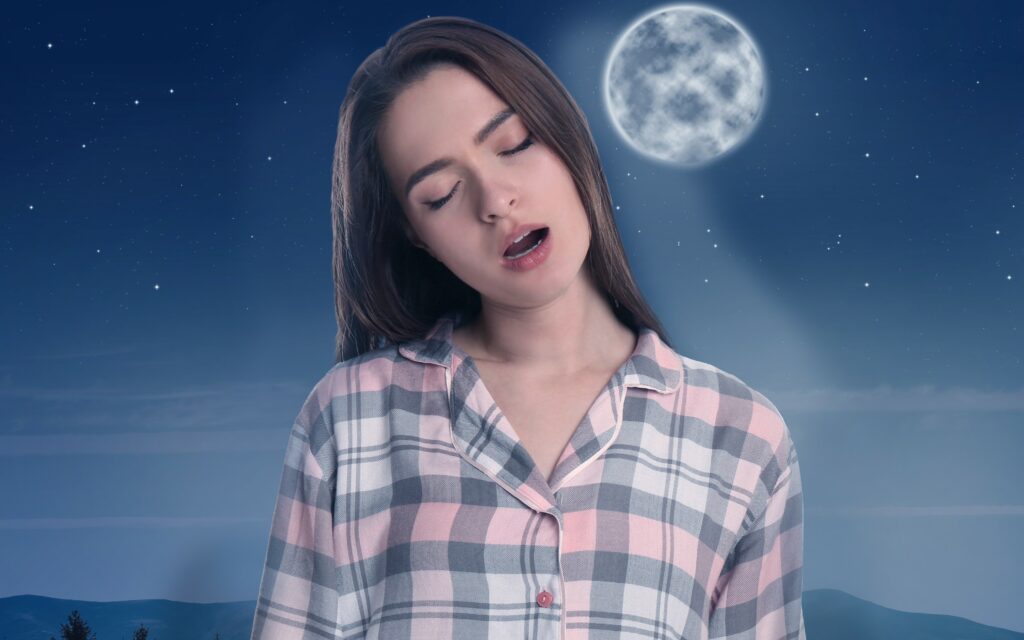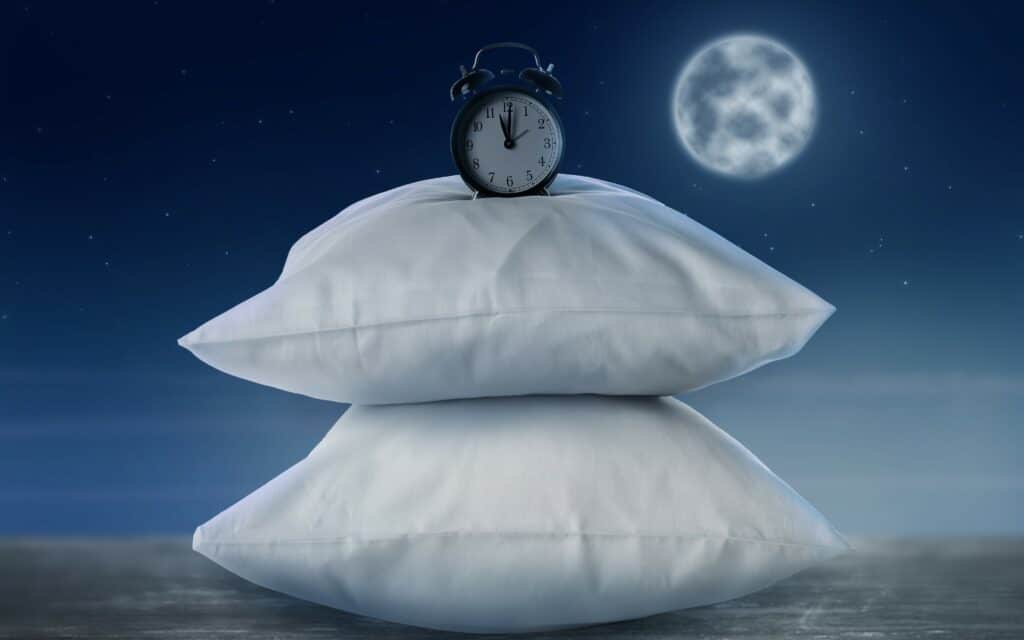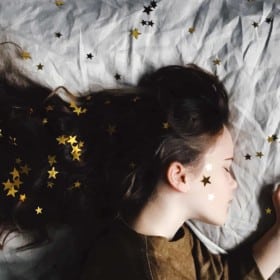Full moon insomnia might sound like an non-scientific concept at first, but researchers are beginning to discover scientific connections between the lunar cycle, and our sleep pattern.
Increasingly, experts believe certain phases of the moon can influence everything from how easily we fall asleep, to how often we’re likely to wake up during the night.
The connection between the moon and our health in general goes back much further than most people realise. For centuries, scientists and philosophers have theorized that phases of the lunar cycle, particularly the full moon, can influence our wellbeing, mental health, and even menstrual cycles.
However, the level of research available into the moon and its influence on how we sleep is limited. We’ve only recently begun to start studying concepts like full moon insomnia. The information we’ve gathered so far is quite compelling.
Here’s everything you need to know about insomnia during a full moon.
Does a full moon affect sleep?
We don’t know precisely how the moon affects our sleep-wake cycle. Most scientists believe there are some important connections to consider. Notably, the majority of research into moon phases and sleep focuses on the full moon. This is when the full surface of the moon is illuminated by the sun, creating it’s round shape in the sky.
The impact of the lunar landscape on our biological rhythms is relatively well-documented in the natural world. In fact, scientists have recorded variations in tree diameter based on exposure to the moon, and noticed changes in the reproduction habits of crabs. The influence the moon has on humans is less clear, but studies are beginning to shine some light on the topic.
For instance, one sleep study analysis found a full moon could be associated with worsened sleep in a number of different ways. During this specific lunar phase, participants typically took up to 5 minutes longer to fall asleep. They took longer to reach REM sleep, and even slept for 20 minutes less. The study participants also experienced a 30% reduction in deep sleep, and reduced sleep quality.
In other studies, researchers noted total sleep time during the full moon was reduced by around 25 minutes, while arousal and awakenings also increased. However, participants in the study also took longer to reach REM during the new moon, which led to some confusing results.
Another analysis looked at data from 319 people undergoing a single night of sleep study. The participants observed during a full moon took longer to reach REM sleep, suffered from less deep sleep, and had reduced sleep efficiency.

Why do people have insomnia during a full moon?
The reason why full moon insomnia is such an issue for some people is still unknown. In one of the most extensive pieces of research on the topic, researchers looked at the sleep pattern of 464 students.
They found regardless of location or light exposure, all the participants took longer to fall asleep, and slept for less time for the full week leading up to the full moon.
Using studies like this, scientists have come up with a number of theories about the nature of full moon insomnia, such as:
Moonlight affects sleep
Many experts believe a full moon causes disruption to our normal sleep pattern because of the amount of sunlight it reflects back to the earth.
Though the moon doesn’t produce it’s own light, it does reflect the light of the sun. This light influences our internal circadian rhythm, dictating how hormone levels rise and fall throughout the day.
Unfortunately, there are some issues with this theory. Moonlight brightness is only around 7% as bright as the light of the sun, so it’s unlikely to have a huge influence on the sleep-wake cycle.
What’s more, the study mentioned above found even when exposed to different types of light, people still slept differently around the full moon.
The Moon and Electromagnetism
Another hypothesis is the moon may cause electromagnetic fluctuations across the earth. The earth’s electromagnetic field has a long tail shaped by solar winds. When the moon orbits the earth each month, it passes through these trails, becoming negatively charged.
Scientists believe the negative charge can then influence the electromagnetic field of the earth too. Some researchers believe humans may be sensitive to these low levels of geomagnetic variations.
Other events based on geomagnetic factors, like the Northern/Southern lights can also have an influence on our health, causing changes in blood pressure and headaches. However, we’re still not sure exactly how electromagnetic charges influence sleep.
Gravity and the Moon
There’s also a theory that the moon’s gravitational pull may have an impact on human health. This theory is based on the understanding that the human body is made primarily of water.
Lunar gravity is known to have an impact on ocean tides. Consequently, the moon is pulling on the water within our bodies too. Of course, there are critics of this theory who say that the gravitational pull of the moon is unlikely to be strong in humans.
At the same time, it’s worth noting the gravitational pull of the moon remains roughly the same regardless of the lunar phase. This means sleep changes which occur specifically around one phase, such as full moon insomnia, are unlikely to be caused by gravity alone.
Why am I always awake during a full moon?
Despite increasing evidence that the full moon does have an influence on people’s sleep habits, it’s difficult to ascertain why this might be. This research shows, that a lunar rhythm has the potential to influence sleep structure in humans regardless of their exposure to light.
There are some instances wherein people may be more likely to be influenced by the moon. Research comparing the effects of moon phases on sleep patterns between genders is relatively limited.
However, one study did find female participants had more trouble sleeping around the full moon than males. In fact, while females had less REM during a full moon, males had more.
Those with mental health issues may also be more deeply impacted by the phases of the moon. Over the years, countless researchers have found a connection between lunar cycles and mental health. Even the word “lunacy” is derived from the word “Lunar” for moon.
In studies into bipolar disorder, researchers found a patient’s mood cycles would frequently synchronize with the phases of the moon. If certain moon phases affect your mood, there’s a good chance you’d be more likely to stay awake as a result of hyperactivity, anxiety, stress, or depression.

Full moon insomnia cures
Because we don’t have much information about what actually causes full moon insomnia, we also don’t have a great deal of data on how to cure the issue.
If you experience insomnia during a full moon, your best strategy may be to simply work on your sleep hygiene. No matter the phase of the moon, practicing good sleep hygiene is more likely to set you up for successful slumber.
This means you should always create a cool and comfortable place to sleep, free from distractions and noise. It’s also worth looking for ways to ensure you fall asleep and wake up at a similar time each day, limit your caffeine intake at night, and create a consistent bedtime schedule.
Other ways to potentially improve your sleeping habits during a full moon may include:
Minimizing light exposure
If it’s true the light of the moon could have an influence on our sleep pattern, then reducing exposure to light could help to maintain your circadian rhythm.
With this in mind, make sure you keep your curtains closed and make your room as dark as possible when sleeping. It’s also worth exposing yourself to more sunlight in the mornings, to assist in setting your body’s rhythm.
Avoid distractions
If the moon is more likely to keep you awake at night, you should avoid distractions which do the same thing.
Most importantly, it’s worth cutting down on how often you use your phone before bed. The blue light emitted by screens can often trick the mind into thinking it’s still day time. Try turning your phone off a few hours before bed.
Practice relaxation
If your mood issues are exacerbated by the moon’s lunar cycles, find ways to relax and de-stress before bed. Consider a routine where you drink relaxing chamomile tea, or soothe your body with a hot bath. You could even practice meditation or yoga to see if these help with your sleep.
Does a full moon cause insomnia?
It’s difficult to know for certain whether full moon insomnia is a true issue for people with sleep problems, or just a coincidence. The research seems to indicate that lunar cycles can have an impact on sleep patterns, but it’s difficult to know why this is.
If you do have trouble getting to sleep during a full moon, it’s worth remembering that these lunar phases don’t last forever. You can always look forward to a good night’s sleep once the full moon has passed.
Or you can try adjusting your sleep schedule based on what you know about your experience with the lunar phases. When suffering from full moon insomnia, maybe you can create a fantastic piece of art in the light of the full moon?
Siestio. Sleep Matters.
General advice disclaimer
This article contains general tips and advice. However, no diet or exercise program should be started without consulting your physician or other industry professional first. For more information read our full disclaimer here.







